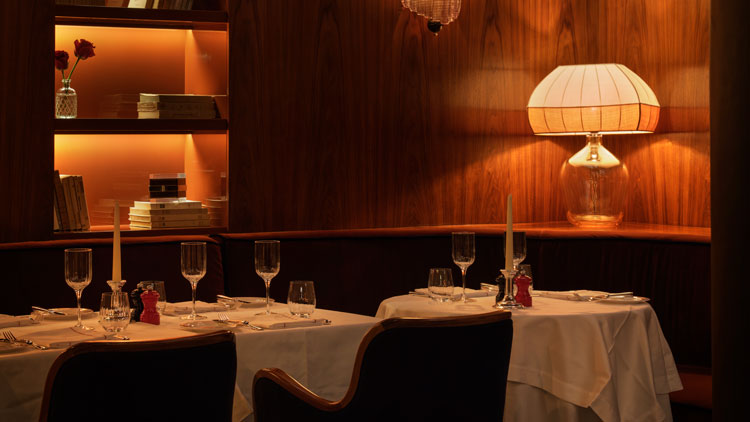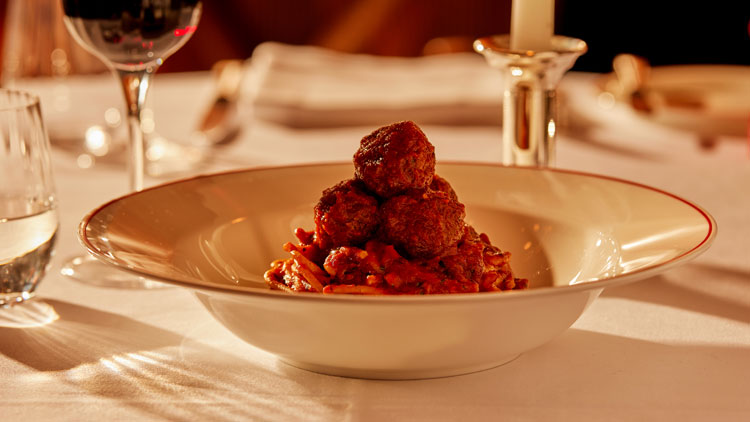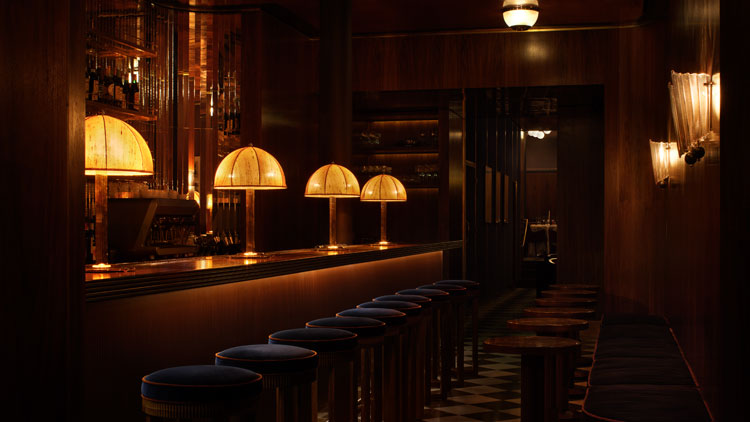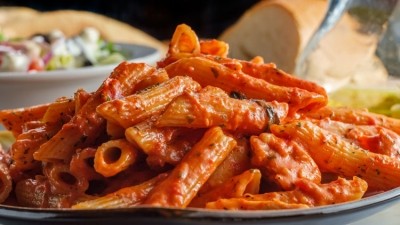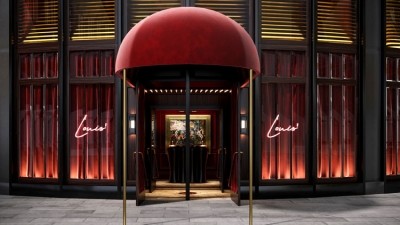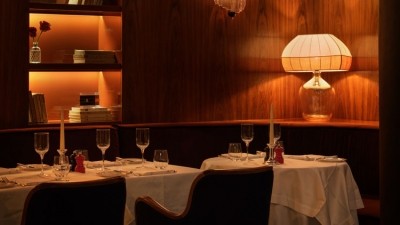Martin Kuczmarski: the man behind London's most captivating new restaurant
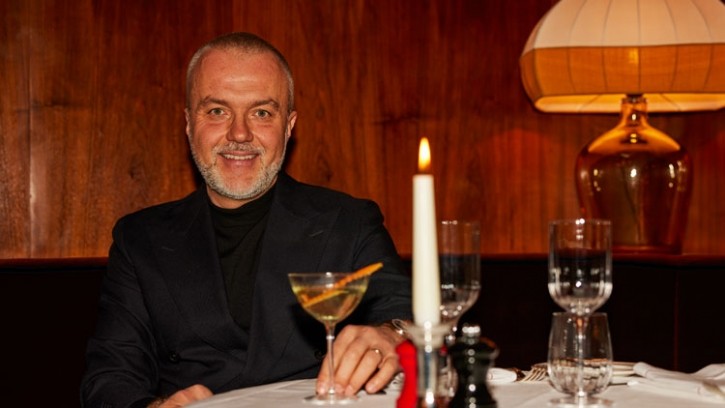
What have Sophia Loren, Al Pacino, Porto Fino, the Orient Express, and a Brooklyn Italian restaurant all have in common? They are all embodied within Mayfair restaurant The Dover, the debut project from former Soho House chief operating officer Martin Kuczmarski.
I’m sat with Kuczmarski on a plush velvet indigo seat surrounded by walnut wood panelling, Murano glass lights twinkling around me, as he describes the – purely fictional – spirit of his new, and admittedly stunning, restaurant. He’s taking me back to the glamour of the late 1960s with Loren, first in a classic Riva Aquarama luxury wooden boat, then later on the Orient Express bound for Milan, and finally en route to New York by Concord as she wends her way to an Italian restaurant in Brooklyn to eat spaghetti meatballs with Al Pacino (now there’s an image I can get on board with).
There’s a hint of Sopranos to the story, and of Mad Men, but you ultimately get the picture – The Dover is a New York Italian restaurant and bar that exudes glamour and art deco charm while also having that slightly edgier Brooklyn neighbourhood Italian feel – albeit through a Mayfair lens.
As design briefs go it’s quite specific, but then you wouldn’t expect anything less from someone who has been the right-hand man to Soho House founder Nick Jones for a decade and a half. When Kuczmarski joined the members club group it had just four properties, when he left in 2022 it had more than 60 all around the world, not including all the various restaurants, with him experiencing Jones’ singular eye for detail and interior design first hand on numerous occasions. The experience has clearly rubbed off on him.
An Italian American restaurant
Born in Warsaw, when Kuczmarski’s parents divorced, he followed his Italian mother to Italy before travelling the world and settling in London. It is his Italian temperament - “I have Polish blood and the heart and passion of an Italian,” he says - and a love of the US that has led to the creation of The Dover, as well as a desire to create a restaurant to suit his rather particular dining needs.
“Me being Italian I love America, I spent a lot of time in New York and LA, and I wanted to bring a little bit of old school hospitality without the pretension,” he says of his project.
“I thought about what I want when I go out for dinner. I want a vodka Martini and I want to go sit at the bar. I don’t want to be rushed; I want to sit down at a table and not be reminded about when I have to leave. I want tablecloths and real candles and I want a proper steak and chips. I couldn’t find the place in London that had all that. I could find pieces but not everything together, so I said to my wife ‘I’m going to take a risk and do it myself’.”
With The Dover, Kuczmarski also wanted to recreate the Italian New York style of restaurant found across Brooklyn and beyond with which he has a fascination. “The food is Italian New York because I grew up in an Italian family and Italian food is quite safe, but in American its flavours are more elevated,” he says.
“No one can write it, remember it, spell
it – it’s a fucking difficult name"
“Spaghetti meatballs doesn’t exist in Italy; it was born in Brooklyn in the 1960s and is cucina povera [the kitchen of the poor] eaten by migrants (Escoffier suggests the dish was probably invented by Italians that came to America between 1880 and 1920 and who bulked up meat with pasta and canned tomatoes because they were cheap to purchase and easy to cook with).
As well as a generous portion of spaghetti meatballs, other New York/Italian dishes on The Dover’s menu include a prawn cocktail served with a New York horseradish sauce; a chopped salad made with iceberg lettuce, chicken, egg, avocado, and cheddar; hot penne arrabbiata; parmigiana ‘Americanata’, a combination of aubergine, pasta sheets, arrabbiata sauce and parmesan fondue; and Italian sausage pie.
Leaving Soho House
The opening of The Dover comes just over a year since Kuczmarski left Soho House, which he joined as director of operations in 2008. He departed the company in September 2022 just a few months before Jones announced he was stepping down as CEO having survived prostate cancer.
“I did Soho house for 15 years, and when it became really big, I was taking 150 flights a year, which was becoming too much for me,” he recalls. “Nick got cancer and was not well and he told me that he didn’t want to do this anymore, and I said I don’t want to do it either. We are very good friends, he’s my mentor and is an important part of my life, so it felt right to leave together.”
Kuczmarski took some time off, travelling for pleasure rather than work, to decompress. “I reflected on what I wanted to do for my next chapter, or even my next book. What I realised is that I love people. I came to hospitality for one reason, to look after people, and that’s what I’ve always done.”
His time off also gave pause to reflect on the London dining scene, which Kuczmarski puts into three categories of new restaurant openings.
“The first one is what I call ‘east’,” he says. “Anything in places like the Meatpacking district, Shoreditch, or downtown LA. They have exposed brickwork, young kids with tattoos, an open kitchen and loud music. They are very innovative and do a brilliant job, but they are not for me.”
"I feel that a lot of operators are just thinking how much money
they can make, what’s their average spend,
how many times can they turn tables"
The second category is what Kuczmarski describes as ‘the big machines’ including brands such a Zuma, Roka, The Wolseley Group, and Soho House, and the third is ‘big and loud’. “After Covid many restaurants became nightclubs. The first thing you notice is a DJ playing loud music and you can’t have a conversation. These places are loud in vulgarity and noise, they are pretentious with a lack of substance.”
In contrast, The Dover is a return to the old school hospitality of Kuczmarski’s early career working at The Hyde Park Hotel, The Ritz in Paris, One Aldwych, and Whatley Manor, where he says the customer comes first.
“Hospitality is about giving people a good time. I feel that a lot of restaurants opening now are for one reason only, to make money. Of course, a restaurant is not a charity, it’s a business that you want to be commercially successful, but many operators are just thinking how much money they can make, what’s their average spend, how many times can they turn tables. What about how they are going to look after their customers and members of staff, and they are going to pay them properly? I think about how I can please the customer as they walk in. If I do that, money will come.”
The Dover is also described by Kuczmarski as the antidote to the hugely expensive Mayfair restaurants that he says have opened up in the past few years. “Mayfair has become too expensive. Everyone says it’s the cost of living and of course life has changed but you can make money without taking advantage of the customer,” he says.
The Dover’s menu is competitively priced for Mayfair, with snacks and starters from £8 to £19, not counting a caviar dish, pasta dishes starting from £14 and mains from £22 for a flat-iron chicken breast rising to £65 for a dover sole.
“We are well-priced for Mayfair,” says Kuczmarski. “It’s morally incorrect to charge £30 for a burger, our burger is £25, and it’s made with USDA prime and comes with fries.”
The design is also a reaction to what Kuczmarski believes is the identikit nature of the high-end restaurant, with the restaurateur purposefully picking a design studio - Milan-based Quincoces & Drago - that had no previous restaurant experience.
“Most new restaurants now look the same,” he asserts. Why is that happening? Because someone who used to work in the design team at, say, Soho House or David Collins decides to imitate its style. Martin Brudnizki is an amazing designer, but he’s designed so many places in London, so suddenly you go to a restaurant, and you recognise that table, that glass, or that finish. I had a very clear idea of how I wanted [The Dover] to look.”
“I walked into the [Quincoces & Drago] studio in Milan and I instantly liked their style. I said, ‘I’m going to ask you three questions and if the answer is no, you’re hired’”. The three questions were whether they had previously designed a bar, restaurant, or hotel, and when they answered in the negative (save for a small project in Tuscany) the job was theirs, and the story of Sophia Loren was brought to life.
More projects on the horizon
The Dover isn’t the only project in which Kuczmarski is involved. Another in the works is Palazzo Parma, a building in the Italian city of Parma originally built as the headquarters of a local agricultural consortium in 1939 and which is being transformed into a new hospitality space, described as being ‘more than a hotel’. Inspired by the theory of kalokagathìa (moral and physical beauty) driving the guest to ‘eudaimonia’ (personal and social prosperity), the project is due to open in late 2025.
Kuczmarski is on the executive team with his recently established company Difficult Name. Rather than being a consultancy, Difficult Name creates, designs, operates, invests and owns hotels, resorts, restaurants and bars.
“I don’t want to be a consultant,” he says. “I have huge respect for them but if I do something I want to be 100% involved. I don’t want to come and tell people what to do, take the money and go. I want skin in the game and to be emotionally connected. The Dover is mine with one partner, and we will operate and manage Palazzo Parma.”
Just like the Sophia Loren story I’m immediately drawn to the name of Kuczmarski’s company, a self-deprecating jab at his surname. “At Soho House Nick couldn’t say or spell my name so he called me MK – and so everyone else did,” he says. “When I left Soho House, I said that I didn’t want to be called MK anymore and so my wife told me to use my full name.”
That’s exactly what he did, initially forming Martin Kuczmarski Company, but later deciding he hated it. Then came a conversation with his wife where he told her: “No one can write it, remember it, spell it – it’s a fucking difficult name.” The rest is history.
